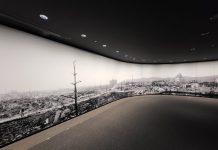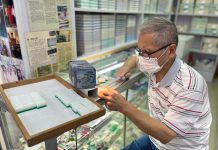“Now I am like a refugee,” Fung Kit-chun moans. Like other villagers, she did not expect to be living in a temporary house for a long time, which is doomed to last even longer.
Fung had planned to spend the rest of her life in her old house. She thought she would not suffer from flooding again after the completion of a drainage system nearby and she spent tens of thousands of dollars on renovations before the government told her to move in 2008.
“I miss my kitchen the most,” Fung says, pointing at a photo of her and her sister in the spacious well-equipped kitchen. She smiles bitterly when looking back at the small kitchen in her temporary house.
Villagers say living in the two-storey temporary houses made of iron sheets can be like a form of torture that eats up people’s strength. There is often a huge difference between the internal and external temperature. In the summer, it is much hotter inside the house than outside, and in winter the situation is reversed.
They complain the houses are of shoddy quality. Rainwater seeps in from cracks and the metal rusts. The house is not soundproofed and Tsang says that on the ground floor you can hear a pin drop upstairs.
Tsang says the compensation she received is inadequate even to cover the construction cost of her new house, which is around HK$700,000. “Only indigenous villagers receive a lot of compensation but not us, the non-indigenous ones,” she says.
Most villagers are classified as non-indigenous residents and they only received compensation ranging from HK$300,000 to HK$600,000. This meant they had to pool their resources to buy the land for Pioneer Field and then build new houses and public facilities in the new village. Many have had to dig into their savings and any increases in construction costs may derail the plans of those who received lower amounts of compensation.
Currently, 37 out of the 47 households who will build houses in the new village are living in the temporary houses. The remaining 10 households have to live outside the village due to a lack of space.
Villager Wong Ping-yuen is one of them. If everything goes according to schedule, the 55-year-old will move into his new house next September. In the meantime, Wong, who is one of the owners of Pioneer Field travels to the new village from Tin Shui Wai every day to farm and socialise.






































